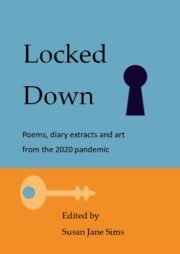
• Archive of all Poetry Space showcases
Guest Editor- Julie Sampson

Julie Sampson lives in Somerset, with her heart and roots in Devon. She works as an independent writer and poet, but was previously a piano teacher, then tutor of creative writing and literature at various colleges in the south-west, including The University of the West of England. She has a PhD on the writer H.D. (Hilda Doolittle)
Julie’s poems have been published in a variety of magazines and anthologies and also online. She has been short-listed or placed in several competitions, Her work was included in Making Worlds; One Hundred Contemporary Women Poets, 2003 (Headland/Second Light Publications) and Fanfare, 2015 (Second Light Publications). She edited Lady Mary Chudleigh’s Selected Poems, 2009 (Shearsman Books) and a full poetry collection, Tessitura, was also published by Shearsman Books, in 2014. A non-fiction manuscript on the history of Devon Women Writers was short-listed for The Impress Prize, in 2015.
Guest Editor’s Overview:
I feel privileged to have been asked to edit this edition of Poetry Space Showcase. It has been a most enjoyable challenge. My approach was to read through all the poems over several days and wait for individual ones to speak and start to settle within me. I found that almost, if not all the poems stood out in one way or other, but gradually a group came to the fore, which demanded more of my attention. The hardest task was to whittle down a preliminary choice of about fifteen poems to a final selection of ten. I was looking for poems that compelled me, perhaps through inviting me to look at a subject or theme through a new lens, or because they were marked by powerful integration of theme and poetic structuring. Although as I begin to write this overview, I realise it was not planned, each poem in the final selection speaks to me in light of a couple of special concerns of our time; that of environmental impact on wild-life and that of the place of the solitary individual in an increasingly fraught world.
I hope you will enjoy reading these poems as much as I have (just wish I could have included more of them) and thank you so much Sue Sims for inviting me to be editor.
Enjoy the selection, then please scroll down for the comments from Julie for each poem. Please note that copyright for all poems Please do not reproduce without permission. SJS
Dormouse
in hazel woods,
in long-abandoned nut orchards
where leaves grow round as cobnuts
clustered in their twig-crooks,
listen for
a barely whispered creaking snore,
whistling breath so small
it’s lost in the shift of leaves,
the heave of branches,
a sleepy rustle in bushes
arching over your head
in a green tunnel…
look for
dormouse lighter than
a pocketful of hazelnuts,
body smaller than your hand,
tail curled around its sleep—
eyes tight shut, but ears pricked;
or look for
two winking black beads
over whiskers…
little holes drilled
neatly in those nutshells
underfoot
before
the dormouse shifts,
moves to sniff fragrances
of mulleins, foxgloves,
to munch on nuts & seeds
before
the coming cold
Lizzie Ballagher
UK
Fieldfares
In a long-shadowed corner of this orchard
the farmer has emptied barrel-loads of fallen fruit;
my father might well have done the same—
I wish I could recall.
He was a blackcurrant farmer,
A man who also loved wild birds.
His keen spirit stalks us in the sharp wreckage
of winter prunings; in the branch boneyard
where cherry trees are skeletons of their summer selves;
where decomposing, dappled pears send out tendrils
of fragrance into frost-pinched, ice-pearled air
and snare the fieldfares as they pass.
Above our heads fat crab-apples hang:
jewels on the bulbous ropes of aged branches,
priceless rubies on a sapphire sky.
A single fieldfare rises, topaz speckled,
white underwings in chevrons, her back
gleaming garnets in the horizontal light.
She turns, flings skyward with her diamond beak aimed
unswerving at the apple sun.
The flock explodes—twelve, twenty, two hundred birds
all mocking frost on hoar-bleached branches;
all celebrating the farmer’s luscious gifts,
chuckling with glee over winter windfalls.
Lizzie Ballagher
UK
From Gathered Wood
From gathered wood the bonfire grew
For weeks till it was ready to
Be lit. Meantime we played in it;
A castle wall, then a rocket,
Then a hide-out for me and you.
One day we saw a hedgehog who
Had found a safe space inside too,
Suddenly come squeaking out. It
Ran off; we trembled.
We do not realise what we do
Or who or what we do it to.
On Bonfire Night the fire was lit.
The hedgehog? What happened to it
We never asked, we never knew.
We weren’t that humbled.
Michael Docker
UK
After Your Death, I Know
That there is always a you; but
most of the time it’s only me.
Your headstone is a sandstone.
A red one; on it: you lived loved.
I still carry your name with me,
always; it says I belonged to you,
or you will belong, always.
I’ve known you a long time now;
even in your absence, that some
possibilities are no longer even
probabilities. I’ve fallen in love
with your empty chair now; I
make love with your pillow —
it does not feel lonely anymore.
I sometimes miss your face, but
there’s a photo album tucked
under my side of the bed. It’s
usually open. —
It does not feel lonely anymore.
Jayant Kashyap
India
The line “That there is always a you” has been borrowed from Jennifer Chang’s poem ‘Again a Solstice’.
‘I don’t know what to say’
He stands with a black fire pot,
filled with orange blooms,
eyes cast down, shoulders hunched.
He stays by the small plot,
longing to speak to her.
In fact, he opens his mouth,
but nothing comes out.
He opens his heart,
a petal drops to the ground.
He opens his eyes,
a cloud gathers overhead.
He utters sounds, bleak
and meaningless, miserable
echoes of the tea-time chat,
last year. They hadn’t said much
and yet they spoke with
smile, movement and sparkle,
blossom and colour.
Now he holds the colour to
his chest, petals wilting;
sees the damp grass, the cruel
blanket covering his wife.
There is no movement, no
sparkle, no touch or laughter.
He turns gently away,
and meets a stranger.
He tells her about the stutter,
the stammer, shows her the
pot of orange love,
tells her about the tea-time,
with the scones, and red jam,
the sparkle and colour, the words
that slipped out so easily;
yes, she’s still there somewhere
in his head, still orange and green,
still gold and purple,
all the colours of the rainbow.
Judy Dinnen
UK
Squeezed like loneliness
space filled to the brim
with spider-whiteness
no bird call
no knock on the door
loneliness
squeezed into a corner
like a hunted animal
waiting
waiting for the phone to ring
for a voice on the other end
of the line
email doesn’t do it
nor Facebook
nor Linked-in
loneliness needs
its own space and time
excelling in taunting
with borrowed laughter
from across the street
the sight of hand on hand
on a Sainsbury’s trolley
a stranger’s accidental touch
his words of apology
like the last drops of loneliness
squeezed from a wash-rag
Moira Andrew
UK
Imagine
Imagine a kiss,
he says, voice thick
impeded
by an oxygen mask.
You think
of a lifetime’s
kisses, warm
wet baby kisses,
inexpert skidding-
across-the-mouth
teenage kisses,
of those
more ardent
more experienced
the man-to-woman
exploring sort.
You remember
bedtimes,
confident
husband-to-wife
Good-night, sleep-well
kisses, knowing
tomorrow would come,
until the day
tomorrow failed
and a run-of-the-mill kiss
morphed into the last,
a dead man’s
kiss.
Moira Andrew
UK
Green Tiger Beetle
In a marram forest sweetened by lilac trumpets
of shore convolvulus, a tiny sun-crazed tiger
lies in wait, coiled as a steel spring.
With the sky as sharp as a blade,
in full lustre, this gaudy long-legged lady,
in sea-green dress and purple stockings
scans the dunes in fearful symmetry;
still as the breath of a foxglove
until fast as fire in parched moorland
she sprints after a spider, tears across crumbs
of silica and seashell. Six-legged slayer, she grabs,
decapitates, gorges with guillotine jaws.
Annest Gwilym
UK
ways to say goodbye
the trick is to not look back
pillars of salt come to mind –
how painful to itch and thirst
melt like a rock in the sun
disperse in rain to become a sea
even a small one with no conscience
you know I never did look back
to say another goodbye or glance
and see your receding figure with
thoughts much the same as mine –
gait and head would reveal so much
and there was no talk about this
being the last time
it’s not really a trick to not look back
I just forget – absorb subtext permutations
of regrets about what should be said –
remove first to a café for coffee
to make it all take longer and go well
beyond the element of surprise at meeting
then saying goodbye is not so sudden
James Bell
UK
Cairn
As I recall those mornings
replete with wonderment and love,
in a log-cottage resembling a castle,
with the window bars framing the sea and the sky
in tens of tiny squares,
I sit pondering how I lost my clarity,
while shadows of fear in the green of your eyes
pulled drawbridges up,
as if a fierce battle was taking place somewhere,
where soldiers fell in heaps one upon the other.
And from those same tiny window squares,
while other nights flamed from torches of passion,
so often escaping toward altars under a sky of no surprises,
I would lose and lose and lose my clarity.
This is how I lament those mornings,
entirely aghast if you could at all read my freedom,
while yourself, though cowering at the end of endlessness,
would still languish and languish in memory dungeons…
Alisa Velaj
Albania
(Translated from Albanian by Arben P. Latifi)
Dormouse
In keeping with its subject, ‘barely whispering’, this is a deceptively muted poem, whose quiet insistence gradually hooked me in. ‘W/whistling breath so small/it’s lost in the shift of leaves’, the poem speaks volumes. I love the broken/split line-layouts, which suggest the creature’s imperceptible ‘shifts, moves to sniff fragrances/of mulleins, foxgloves, /to munch on nuts & seeds’ and the delicate sounds achieved through mindful use of half-rhymes and subtle rhythms. Such a lovely capturing of the natural world.
Fieldfares
leapt out during my first reading, evoking pathos, ‘I wish I could recall’. A poem of layerings, its image of the ‘long-shadowed corner’ – of garden, and of mind, whose winter’s sigils, ‘in the branch-boneyard’, return the mind to the past of a father’s once presence. Full of synaesthetic imagery – ‘dappled pears send out tendrils/of fragrance into frost-pinched/ ice-pearled air/and snare the fieldfares as they pass’, whose exquisite and evocative effects are highlighted with assonance and sibilance.
From Gathered Wood
casts a topical spotlight on the current depletion of the natural world. Contrasting animal and human dualities and compressing several layered dichotomies (child/adult’; child/nature/; adult/nature), the poem takes a poignant and understated look back to an incident in the narrator’s childhood past. Shows adroit use of word-order, clever use of repetition and subtle half-rhyming: ‘We do not realise what we do/Or who or what we do it to’ … ‘. The apparently throw-away yet deliberately crafted last line, ‘We weren’t that humbled’, sends its vital message out to a largely unhearing world.
After Your Death I Know
I kept returning to this compelling poem to savour its intricate juxtaposition of apparently contrary meanings – ‘(After Your Death, I Know/That there is always a you;/but most of the time it’s only me’) – which, intensified with its allusion to another poet/poem, unfold rich depths of meaning with each fresh reading. Such a moving poem, whose unusual slant on grief (its ‘staged journeys’) expressed through its formalities (mirroring couplets and stand-out images (I’ve fallen in love/with your empty chair now; I/make love with your pillow’), demonstrate the poet’s ability to match emotion with poetic-skill. A poem which will speak to anyone experiencing bereavement.
‘I don’t know what to say’
Another poem which unfolds an unexpected perspective on bereavement. The poem marks the desolate contrast between the speaker’s lost vibrant life with his beloved and the bleak reality of the world without her. Its impact stems from the opening lines, ‘He stands with a black fire pot, /filled with orange blooms, / ‘, an intriguing visual image, which becomes emblem, ‘pot of orange love’, a container for the joy and pain of the speaker’s unspoken grief. I like the solace suggested by the last lines: ‘she’s still there somewhere/in his head, still orange and green, /still gold and purple…’
Squeezed like loneliness
This poem’s unusual title and distinctive last striking simile, ‘like the last drops of loneliness squeezed from a wash-rag’, immediately caught my attention. A take on a topical issue of our day, the poem’s power lies in its short curt lines, its stand-out images – ‘spider-whiteness’ ‘borrowed laughter/from across the street’, ‘loneliness needs its own space and time’ and its blend of pathos and irony. This poem has a stark message for our time.
Imagine
Such a compelling poem with its moving evocation at the scene of a husband’s death-bed. The poem journeys through a life-history of kisses, exploring them through varying time-lenses and within a framework marking the brief moments of that passing: ‘Imagine a kiss, /he says, voice thick/impeded/by an oxygen mask’ and ‘morphed into the/last,/a dead man’s/kiss. The consequent bifocal time-dissonance is emphasised via the layout, with its short lines and long shape. A pitch-perfect poem.
Green Tiger-Beetle
A poem which initially attracted me in light of the topical concern about insect die-back and intrigued me more with each new reading. The sensory close-scrutiny of a creature ‘in fearful symmetry’, is reminiscent of and perhaps in direct dialogue with Blake’s The Tyger. Here, that poem’s vision is upturned, inverted; the tiny beetle seen through the microscopic lens becomes ‘tiny sun-crazed tiger’ with ‘sea-green dress and purple stockings’, and ‘still as the breath of a foxglove’ The beautiful images conjure the poet’s vision and when beetle ‘tears across crumbs/of silica and seashell …. grabs, /decapitates, gorges with guillotine jaws.’, the message about the vital importance of insects on the food-chain is driven home.
Ways to say goodbye
A quirky, thought-provoking look at farewells, ‘the trick is not to look back’, and with a nod to Lot’s wife, ‘pillars of salt come to mind’, this poem’s speaker challenges conventional clichéd outbursts of angst. A contemporary version of Donne’s shrewd love-lyrics, ‘it’s not really a trick to not look back/I just forget – absorb subtext permutations/of regrets about what should be said’, I enjoyed the rhyming /half-rhyming echoes, such as (forget/regrets; mine/time), which heighten the subtlety of the poem’s witty word-play.
Cairn
And finally, this mysterious fairy-tale, Gothic-like poem set ‘in a log-cottage resembling a castle, /with the window bars/framing the sea and the sky/in tens of tiny squares’, beguiled me. The poem’s juxtaposed title and framing image of ‘tiny window squares’, though open to interpretation, suggest powerful undercurrents of feeling, worlds within worlds – ‘memory dungeons’. The repetitions of phrases ‘lose and lose and lose’ and ‘languish and languish’ produce a cumulative effect, whilst tension builds with the contrast between the closeted, restricted space, ‘from those same tiny window squares’ – from where the persona apparently speaks – and that of the ‘other’, ‘cowering at the end of endlessness’.
Please note the copyright for all poems and images remains with their creators.
Please note that Julie chose the poems anonymously The order they appear in the showcase does not reflect any preference.







